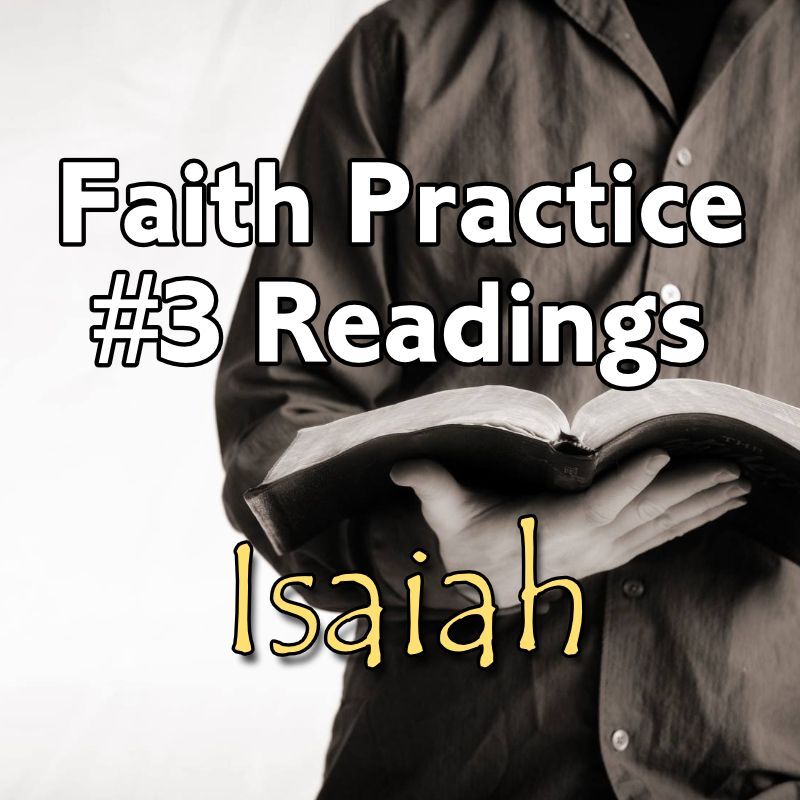
Item number three on our list of Seven Faith Practices is “read and study the Bible.” Each week we, as a congregation, will be reading one chapter from a book of the Bible. Currently, we are reading the book of Isaiah.
The Book of Isaiah spans a time of political crisis, moral decline, and looming judgment, but also carries a profound message of hope, redemption, and God’s ultimate plan for salvation. Although Jewish and Christian tradition attributes the whole book to the prophet Isaiah of Jerusalem (8th century BCE), many scholars believe Isaiah was written by multiple authors over different periods. Isaiah can be divided into three main sections or eras…
1. First Isaiah (Chapters 1–39) - “Isaiah of Jerusalem”
This is traditionally attributed to the historical prophet Isaiah, who lived in Judah in the 8th century BCE. It focuses on warning Judah and Jerusalem about social injustice, idolatry, and the threat of Assyria.
2. Second Isaiah (Chapters 40–55) - “Deutero-Isaiah”
This section was likely written during the Babylonian exile (6th century BCE), centuries after Isaiah’s lifetime. These chapters emphasize comfort, hope, and restoration, addressing exiled Israelites. Here we find the Suffering Servant and the promise of return from exile.
3. Third Isaiah (Chapters 56–66) – “Trito-Isaiah”
These chapters seem to have been written after the exile (late 6th century BCE or early 5th century BCE). They focus on life in the restored community, social justice, worship, and the future glory of God’s kingdom.
We will continue with our “one chapter per week” schedule. I hope you will consider joining us as we practice our faith!
Our reading schedule is as follows: for the week starting…
Faith Practice #3 Reading Schedule...
January 5 – Isaiah 1
January 12 – Isaiah 2
January 19 – Isaiah 3
January 26 – Isaiah 4
February 2 – Isaiah 5
February 9 – Isaiah 6
February 16 – Isaiah 7
February 23 – Isaiah 8
March 2 – Isaiah 9
March 9 – Isaiah 10
March 16 – Isaiah 11
March 23 – Isaiah 12
March 30 – Isaiah 13
April 6 – Isaiah 14
April 13 – Isaiah 15
April 20 – Isaiah 16
April 27 – Isaiah 17
May 3 – Isaiah 18
May 11 – Isaiah 19
May 18 – Isaiah 20
May 25 – Isaiah 21
June 1 – Isaiah 22
June 8 – Isaiah 23
June 15 – Isaiah 24
June 22 – Isaiah 25
June 29 – Isaiah 26
July 6 – Isaiah 27
July 13 – Isaiah 28
July 20 – Isaiah29
July 27 – Isaiah 30
Aug 3 - Isaiah 31
Aug 10 - Isaiah 32
Aug 17 - Isaiah 33
Aug 24 - Isaiah 34
Aug 31 - Isaiah 35
Sep 7 - Isaiah 36
Sep 14 - Isaiah 37
Sep 21 - Isaiah 38
Sep 28 - Isaiah 39
Oct 5 - Isaiah 40
Oct 12 - Isaiah 41
Oct 19 - Isaiah 42
Oct 26 - Isaiah 43
Nov 2 - Isaiah 44
Nov 9 - Isaiah 45
Nov 16 - Isaiah 46
Nov 23 - Isaiah 47
Advent Break / No Reading
Jan 4, 2027 Isaiah 48
Jan 11, 2027 Isaiah 49
Jan 18, 2027 Isaiah 50
Jan 25, 2027 Isaiah 51
Feb 1, 2027 Isaiah 52
Feb 8, 2027 Isaiah 53
Feb 15, 2027 Isaiah 54
Feb 22, 2027 Isaiah 55
Mar 1, 2027 Isaiah 56
Mar 8, 2027 Isaiah 57
Mar 15, 2027 Isaiah 58
Mar 22, 2027 Isaiah 59
Mar 29, 2027 Isaiah 60
Apr 5, 2027 Isaiah 61
Apr 12, 2027 Isaiah 62
Apr 19, 2027 Isaiah 63
Apr 26, 2027 Isaiah 64
May 3, 2027 Isaiah 65
May 10, 2027 Isaiah 66



